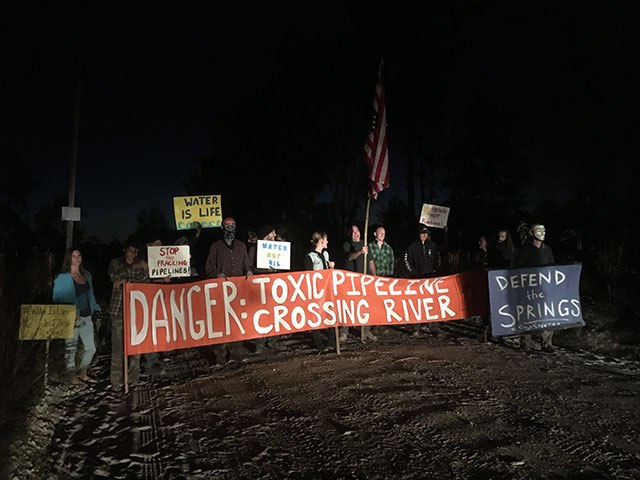Filed under: Featured, Southeast

It’s been a hard month for those of us who dedicated so much of our lives over the past year to tracking, exposing and disrupting the construction of the Sabal Trail pipeline. What follows is a brief synopsis of recent news and events.
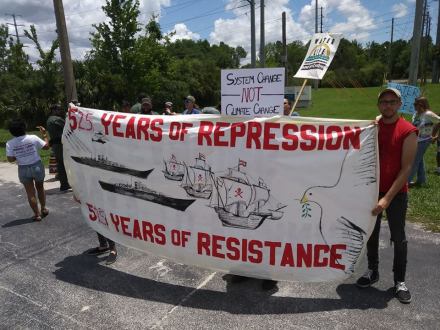
On June 9th a powerful demonstration was held at the pipeline compressor station in Davenport, just south of Orlando. Though there was no civil disobedience occurring and minimal confrontation, the law enforcement present—several of whom identified themselves as being on the payroll of the company that day—chose to make three pointless arrests. There is a short video about that event here.
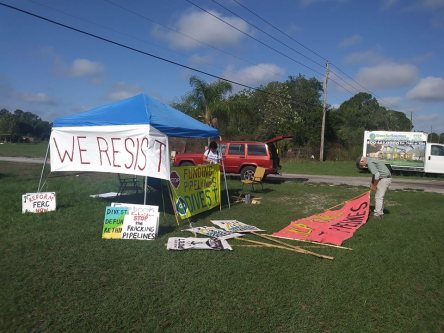
A week later we found out that gas is now flowing through parts of the pipeline. The following is an excerpt from a Gainesville Sun article about that:
After months of countless protests, at least two dozen arrests and about 170 property owners sued over eminent domain, Sabal Trail Transmissions has gas flowing through its new $3.2 billion pipeline.
Andrea Grover, the company’s spokeswoman, confirmed via email that the Sabal Trail pipeline began flowing natural gas through the 36-inch-wide conduit on June 14. …
The project is broken into three phases, with a majority of phase one completed, which includes Marion County and Alachua County. A compressor station in Dunnellon is expected to be completed in 2020 as part of phase two. Phase three includes adding horsepower to the established stations.
Grover wrote that she expects all of phase one to be complete by the end of June. …
Panagioti Tsolkas, a lifelong protester and organizer with Earth First!, has been organizing protests throughout Central Florida to raise public awareness about the pipeline’s potential danger.
Tsolkas said he heard rumors that Sabal Trail reached one of its milestones, but wasn’t sure the gas was on. Still, it doesn’t change his objective, he said.
“The fight doesn’t stop just because they turned the gas on,” he said. “Now the fight is to turn the gas back off.”
And on top of all that, last week week the Florida Highway Patrol (FHP) and Florida Department of Law Enforcement (FDLE) finally released the findings of their internal investigation regarding the killing of an environmentalists and military veteran, Jim Marker, who was shot by the police in February after damaging a section of the pipeline and several pieces of heavy machinery in Marion County. The FDLE decision to absolve FHP Trooper Nicholas Dolan of responsibility for Marker’s death does not come as a surprise, in the wake of not-guilty rulings like that of Philando Castile’s death at the hands of an officer in Minnesota. Across the country, police are well known for their ability to kill with impunity.
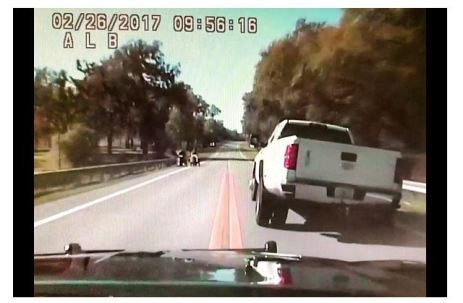
In Marker’s case, the video released by the Gainesville Sun and a copy of the associated report (obtained through a records request by STR) leave many questions remaining. The FDLE report says three Citrus deputies and Dolan fired at Marker between 54 and 58 times, striking him at least 12 times. Police say Marker held a .45-caliber pistol in his right hand, but provide no actual evidence of this, and though they initially made a claim that he discharged a weapon during the incident, they were forced to retract it.
In his testimony, Dolan claimed to see Marker flash a gun at him when he passes him driving in the opposite direction. This brief moment can be seen in the video, and occurs so fast that its near impossible to believe anything like that could be seen in the window of the passing vehicle. Further, what officers allege to be a threat to their lives, claiming Marker exits his vehicle with hands up, but then turns to shoot at them, actually occurs in less than three seconds between the impact of being run off the road by Dolan and the initiation of heavy firing.
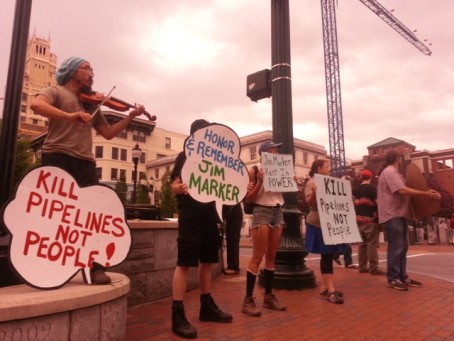
Despite the presence of multiple law enforcement agencies, none of what occurred is actually visible in the single FHP video released (the other agencies claim to not use dash cams.) But all that is heard from Dolan in the video in those three seconds is “Get Down, Get Down,” not “Drop your weapon.”
At least one officer, CCSO Deputy Watts, indicates in the report that he saw Marker’s hands go up, but did not see a gun in them. The dash cam video is inconclusive, and more questions need to be asked. For starters, how many of the cops on the chase that day were working for the pipeline company? We know that Sabal Trail has been employing off-duty law enforcement from state and county agencies across the state to protect their profiteering pipeline, including arresting protectors and photographers, charging them with bogus felonies to harass and intimidate them (none of the 19 felonies over 3 counties have been able to stick)… Are they now sentencing people to death for damaging their equipment?
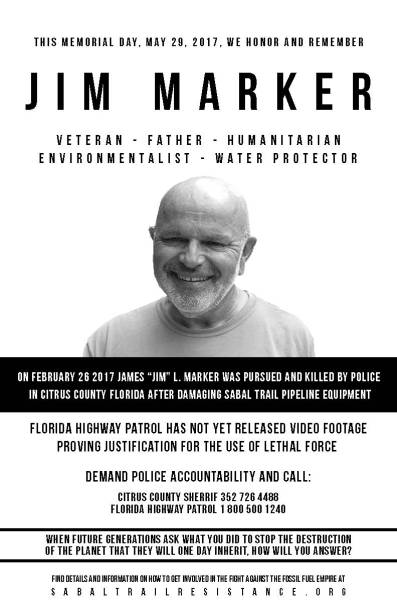
As we pointed out back in March, prior to a series of memorial activities honoring Marker, Amnesty International report from 2015 indicated not a single state in the U.S. has laws that meet international human rights standards for “use of force” by police officers. Though Florida is among the only eight states in the U.S. to require a verbal warning by police officers before shooting, the only available evidence indicates this did not occur in Marker’s case.
All information available to us at this time continues to indicate that Jim died as an honorable warrior, killed for being a water protector of the Floridan Aquifer, which provides water to millions of people and countless other species. As such, he deserves to be remembered as a lover of humanity and the Earth. In his honor, we continue to escalate our fight against the Sabal Trail pipeline and we demand accountability from the law enforcement agency for the use of deadly force against him.
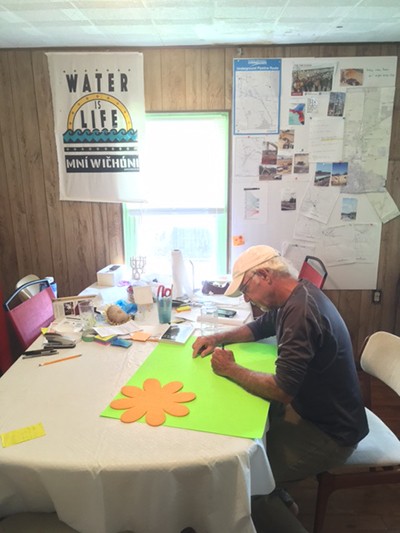
On a more uplifting note, after 8 months of direct action to stop Sabal Trail, our efforts continue getting positive media attention nationwide, and the pressure from legal defense efforts connected to anti-pipeline actions is also being seen and felt. Independent news sources like Truth Against the Machine have been diligently posting about ongoing violations and scandal from Sabal Trail pipeline construction.
Meanwhile, water protectors Karrie Kay Ford and Niko Segal-Wright, intitially facing felonies for crawling into a section of pipe under construction, have had those charges dropped down to misdemeanors and resolved their cases without jail time. (Note: they are still facing court-related costs and could use your help in covering those.)
At this time, there are at least four people still facing charges for anti-pipeline actions at the Sante Fe River in Gilchrist County. They are expected to go to trial in the fall, and if the charges are no dropped by then, we want to help them pack the courthouse and show Sabal Trail that we are still here.
And last, the following is an excerpt from a story by Alexis Bonogofsky, published June 8 on TruthOut.org titled “This State is on the Front Lines.” It offers an important update on the pending legal challenges that could still pull the plug on this pipeline, and the longer term vision that keeps us in the fight:
On March 23, Sierra Club and the Gulf Restoration Network asked FERC to halt construction of the Sabal Trail pipeline. They requested that FERC “correct its use of materially false or inaccurate information to authorize the project; prepare a Supplemental Environmental Impact Statement; and stay construction and operation of the Project pending completion of the actions.”
Previously, on September 16, 2016, the Sierra Club, Flint Riverkeeper and Chattahoochee Riverkeeper filed a lawsuit in the US Court of Appeals for the District of Columbia challenging FERC’s approval of the project, arguing that FERC failed to analyze the climate impacts of the project and the power plants it would serve, and also failed to adequately analyze alternate routes that would have less impacts on the environment and communities of color. That lawsuit is still pending.
[Peter Ackerman of the Water Is Life House in Dunnellon] knows what they are up against, but he’s not daunted. He points to the ways in which pipeline resistance efforts around the country — and the world — are connected.
“We aren’t a bunch of isolated independent struggles,” he said. “We are united in this effort, not only in this country but worldwide. We are living victory. We know what the future is going to be and it’s not going to be fossil fuels.
We hope to see you out in the streets!
